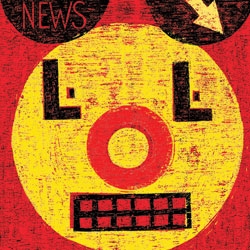(单词翻译:单击)

“News is what somebody does not want you to print. All the rest is advertising,” runs the journalists’ mantra, variously ascribed to publishers William Randolph Hearst and Lord Northcliffe. If so, news is being deluged.
记者们有一句座右铭:“新闻是某些人不希望你印出来的东西。其他都是广告。”这句话有人说是威廉•兰道夫•赫斯特(William Randolph Hearst)说的,也有人说是诺斯克利夫勋爵(Lord Northcliffe)说的。如果这话属实,那么新闻正处于四面楚歌的境地。
In 2014, the fastest-growing form of online “content” is an epidemic of heartwarming videos (“One Mother Did Something Illegal To Help Her Kids, And This Cop Was Totally, Unexpectedly Cool”), funny lists (“33 Reasons Miley Cyrus Was Actually The Best Thing To Happen To 2013”) and click-bait headlines from sites such as BuzzFeed, Upworthy and ViralNova.
2013年增长最快的在线“内容”形式是像传染病一样四处传播的感人视频(“一位母亲为帮助孩子不惜以身涉法,警察太棒了,让人完全没想到(One Mother Did Something Illegal To Help Her Kids, And This Cop Was Totally, Unexpectedly Cool)”)、各种有趣清单(“麦莉•赛勒斯是2013年最大惊喜的33个理由(33 Reasons Miley Cyrus Was Actually The Best Thing To Happen To 2013)”)以及来自BuzzFeed、Upworthy、ViralNova这类网站的诱人点击的标题。
Rather than being found on news sites or through search engines, they flourish on social networks such as Facebook and Twitter . While reporters pride themselves on digging out bad news and awkward facts, these stories often appeal to positive emotions – affection, admiration and awe. They are packaged to make people share content with friends, and to spread like a virus.
这些内容不是来自新闻网站或搜索引擎,而是在Facebook和推特(Twitter)这类社交网络上大行其道。尽管记者们以发掘坏消息和糗事为荣,以上故事却常常能引起人的正面情绪——爱、赞赏和敬畏。它们的包装方式就是为了便于与朋友分享,然后像病毒一样扩散。
Some of this is advertising – BuzzFeed designs viral campaigns for companies that are difficult to tell apart from its other output. Much of it has an advertising-like aspect. Viral producers devote as much effort to marketing content as to concocting it, like an advertising agency married to a newsroom.
有些做法属于广告——BuzzFeed为一些公司设计了病毒营销方案,帮它们从该网站的其他页面中脱颖而出。这一做法中的很大一部分具有广告效果。病毒内容制造商在推销和制作方面花的精力一样多,他们就像是广告代理商与报社编辑部的结合体。
That upsets many journalists: complaints range from the blurring of the line between editorial and advertising to the way faked videos and Photoshopped pictures have at times become viral sensations without being fact-checked. Upworthy’s efforts to tug at readers’ heartstrings enrage sceptical editors.
这一点令许多记者不安,他们抱怨这模糊了新闻编辑和广告制作的界限,还抱怨虚假的视频和经过编辑的照片时不时未经验证就成为病毒式的轰动新闻。比如,Upworthy网站多次试图拨动读者心弦的做法,就激怒了持怀疑态度的编辑们。
“The crowd will eventually choose the juicy truth over a heartwarming hoax,” Nick Denton, publisher of the Gawker news and gossip sites (and a former Financial Times journalist), declared defiantly in December as BuzzFeed’s traffic overtook his own.
2013年12,新闻和闲聊网站Gawker的出版商、曾任英国《金融时报》记者的尼克•丹顿(Nick Denton)在BuzzFeed的流量超过他的网站时曾轻蔑地宣称:“这些人最终会选择有趣的真相,而不是温暖人心的段子。”
But I find it hard not to laugh at the moral outrage of news publishers whose muckraking is outflanked by cute cat videos. As long as media buyers and advertisers do not distinguish among consumers who find news through search engines and those who are drawn to entertainment through Facebook likes and Twitter mentions, all free content will compete equally and volume will win.
然而,我禁不住要嘲笑那些新闻出版商的道德义愤了——他们披露的丑闻影响力还赶不上可爱的猫咪视频。只要媒体采购机构和广告商不区分那些用搜索引擎寻找新闻的顾客和出于娱乐目的而被Facebook的“赞(like)”及推特的“提到(mention)”吸引的顾客,所有免费内容都将平等竞争,点击量将决定一切。
The reality is that Gawker and sites such as Mail Online, drawn from the UK tabloid tradition, face being hoist by their own petard. Having defined success by how many clicks they gain for sensational stories, they find that someone else has invented a better traffic trap (although the fast-growing Mail Online still beats BuzzFeed on number of visitors).
现实是Gawker及脱胎于英国小报传统的Mail Online这类网站正面临自食其果的窘境。它们原本以轰动性报道所获点击率来衡量报道的成功程度,如今他们却发现,其他人发明了比他们更吸引点击量的的东西(尽管快速成长的Mail Online访问人数依然打败了BuzzFeed)。
The inventor is Jonah Peretti, co-founder of the Huffington Post and founder of BuzzFeed. From an early experience of a viral email exchange with Nike when he tried to have the word “sweatshop” printed on a pair of running shoes, he has become a pioneer of digital word-of-mouth.
这种策略是由《赫芬顿邮报》(Huffington Post)共同创始人、BuzzFeed网站创始人乔纳•佩雷蒂(Jonah Peretti)发明的。当初,他曾试图在一对跑鞋上印上“血汗工厂(sweatshop)”一词,当时他与耐克(Nike)之间的病毒式电子邮件往来经历,令他成为数字化口碑式传播的先锋。
His insight was that sharing works differently from search. Search is a way to discover information, whereas sharing is prompted by emotion. People read all kinds of material but they mostly share stories or videos that create positive reactions, such as laughter; or actively negative ones, such as anger.
他意识到,分享与搜索具有不同的运行方式。搜索是发现信息的途径,而分享则是由情绪推动的。人们会阅读各种各样的材料,但多数情况下,他们会分享的内容要么是那些引起正面反应(比如令人大笑)的故事或视频,要么是那些产生积极负面反应(比如愤怒)的内容。
One study of 7,000 New York Times articles by two professors at the University of Pennsylvania’s Wharton School found that sad stories were the least shared because sadness is a low-arousal, negative state. People were more likely to share positive stories because it was a way to show generosity and boost their reputations. Sharing pleasant things in public made them appear nice themselves.
宾夕法尼亚大学(University of Pennsylvania)沃顿商学院(Wharton)两位教授研究了《纽约时报》(New York Times)的7000篇文章。他们发现,悲伤的报道被分享得最少,因为悲哀是一种刺激性较低的负面状态。人们更喜欢分享正面报道,因为这是一种体现宽容和提高声誉的方法。在公开场合分享愉快事物能令人们自身显得很善良。
This is enough to make old hands tear their hair out (“What works in viral is fake piety,” says one); and it has combined with a shift to video as broadband speeds increase. The internet, originally a means for academics to share information, is becoming primarily an entertainment medium where a juicy headline on a video is text enough.
这一点足以令新闻界的老手抓狂(其中一位曾说道:“病毒式推广生效的原因是一种假惺惺的虔诚”)。而随着宽带网速的提升,视频内容日益增多也助长了这一现象。最初只是学术界信息共享手段的互联网,如今却主要成了一种娱乐媒介——在这种媒介上,一个吸引眼球的视频标题就足以替代所有文字。
Not all viral content is trite and shallow. The techniques pioneered by Mr Peretti can, like advertising campaigns, be applied to all kinds of products. Upworthy, which drew 88m unique users in November, according to Quantcast, uses them to lure people to videos on liberal causes such as gay marriage and poverty alleviation, and persuade them to donate money. “Content on important topics is often dry, like the Brussels sprouts part of the meal that you have to choke down,” says Eli Pariser, co-founder of Upworthy. “We thought: why does it have to be that way? Why can’t you make it taste good, so people want to eat?”
不是所有病毒式内容都陈腐而肤浅。和广告营销一样,由佩雷蒂首创的这种技术能被运用到所有产品上。根据Quantcast的数据,2013年11月份Upworthy网站吸引了8800万不同用户。该网站就利用这种技术,以同性婚姻和消除贫困等自由派的事业来吸引人们观看视频,并说服他们捐钱。Upworthy共同创始人伊莱•帕里泽(Eli Pariser)表示:“有关重要话题的内容总是干巴巴的,就像是一顿饭里总有不得不咽下的球芽甘蓝。我们的想法是:事情为何一定要这样?为什么不能把它弄得好吃一些,让人喜欢吃呢?”
Meanwhile, BuzzFeed has stepped up its journalistic efforts, adding in-depth reporting on politics and business to its fluffier material. It has 140 reporters, started a UK site in 2013 and will add an investigative journalism unit this year.
与此同时,BuzzFeed也加大了在新闻领域的动作,在十分温情的内容中加入了政治和商业方面的深度报告。该网站拥有140名记者,在2013年启动了一个英国站点,今年还将增加一个新闻调查部门。
Virality could eventually strike its limits. People may tire of clicking on Upworthy’s saccharine headlines (“Watch This 6-Year-Old Give You The Most Adorable Guilt Trip Ever”). BuzzFeed’s lists of “10 Adorable Photos” and “40 Astonishing Facts” could go out of fashion.
病毒式推广最终可能会走到尽头。人们可能会厌倦于点击Upworthy的情绪化标题(“看看这个,6岁孩子为您展示超萌负疚之旅(Watch This 6-Year-Old Give You The Most Adorable Guilt Trip Ever)”)。而BuzzFeed的“10大萌照(10 Adorable Photos)”和“40个惊人事实(40 Astonishing Facts)”也可能不再流行。
News publishers should not count on it. Not only are BuzzFeed and others growing fast but they are flexible enough to adjust tactics in response to audience demand. They can also expand around the core of viral content, as BuzzFeed has done. Like television networks with news divisions, they can combine the serious and the amusing.
对此,新闻出版商不能做太多指望。BuzzFeed和其它类似网站不但增长十分迅速,而且也足够灵活,能够改变战术适应观众需求。它们还有可能BuzzFeed那样扩充病毒式内容的内核。它们和拥有新闻部门的电视网一样,能够做到集严肃性和趣味性于一身。
Ultimately, entertainment is a bigger business than news. That was true of the analogue world and there is no reason to think it will change online. The lesson of the viral epidemic for news publishers is that, if you battle for attention with entertainment, you lose.
归根结底,娱乐业务的规模比新闻更大。这一点适用于模拟世界,我们没理由认为到了在线世界,情况会有所不同。对于新闻出版商来说,病毒式推广的教训就是:如果要和娱乐争夺眼球,那就必输无疑了。


